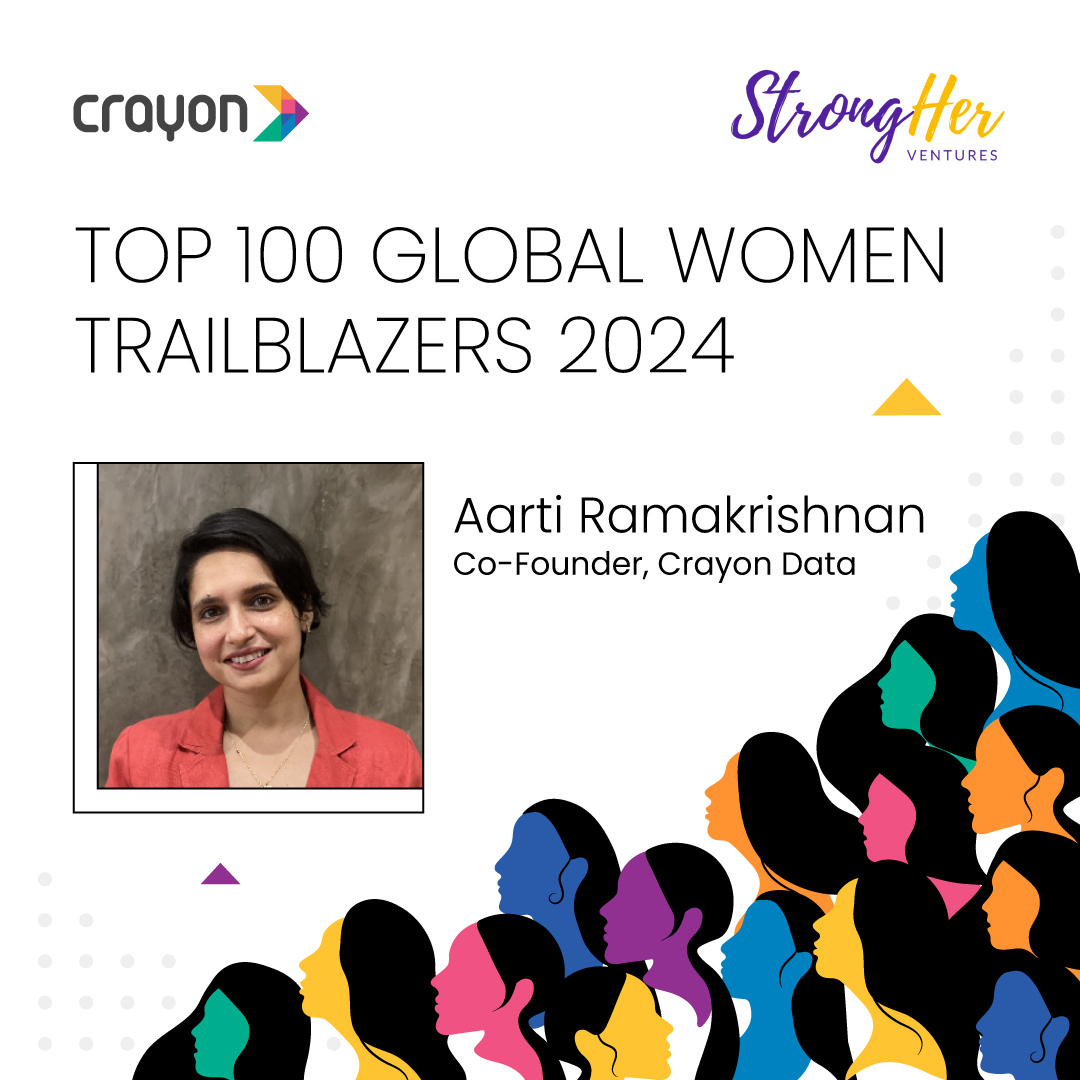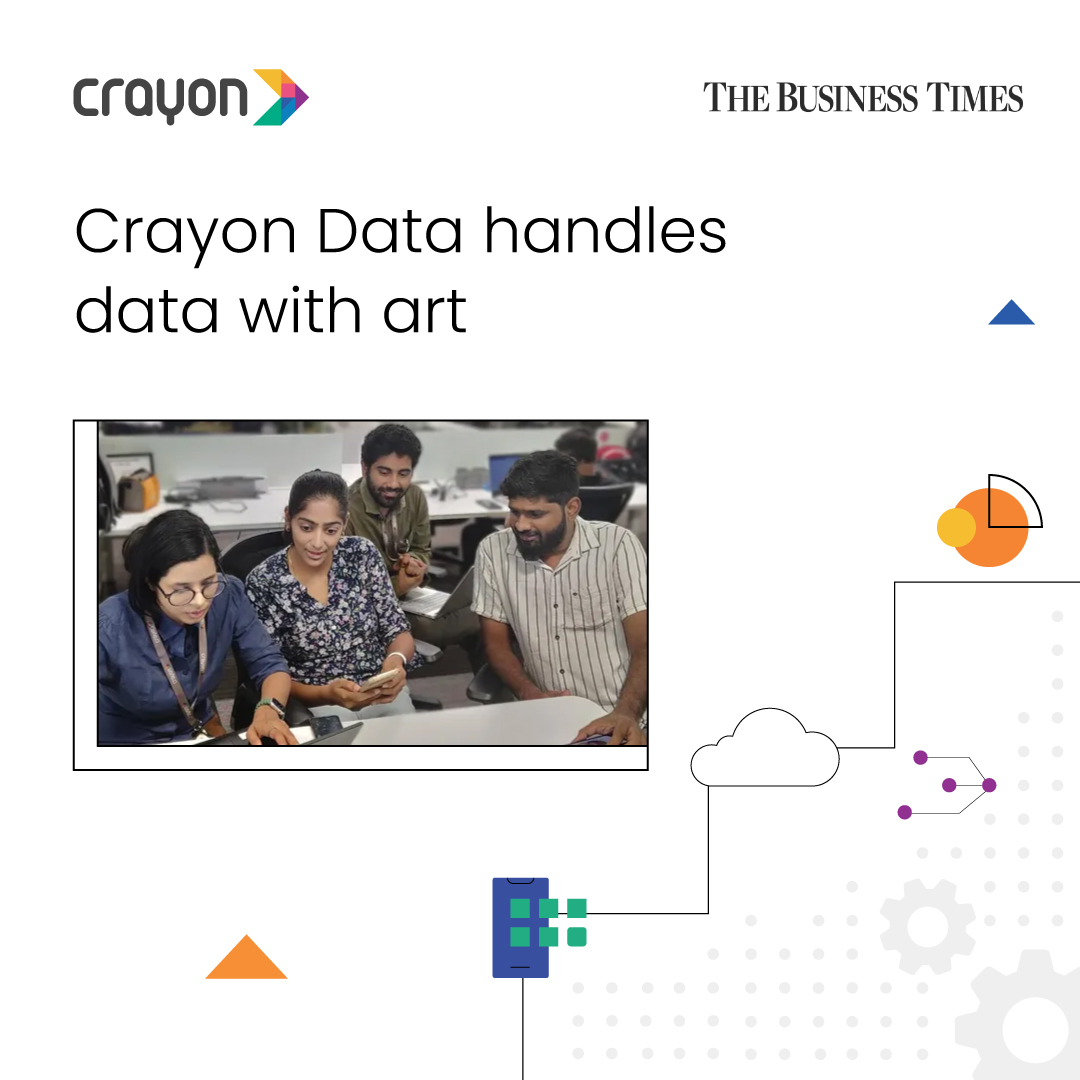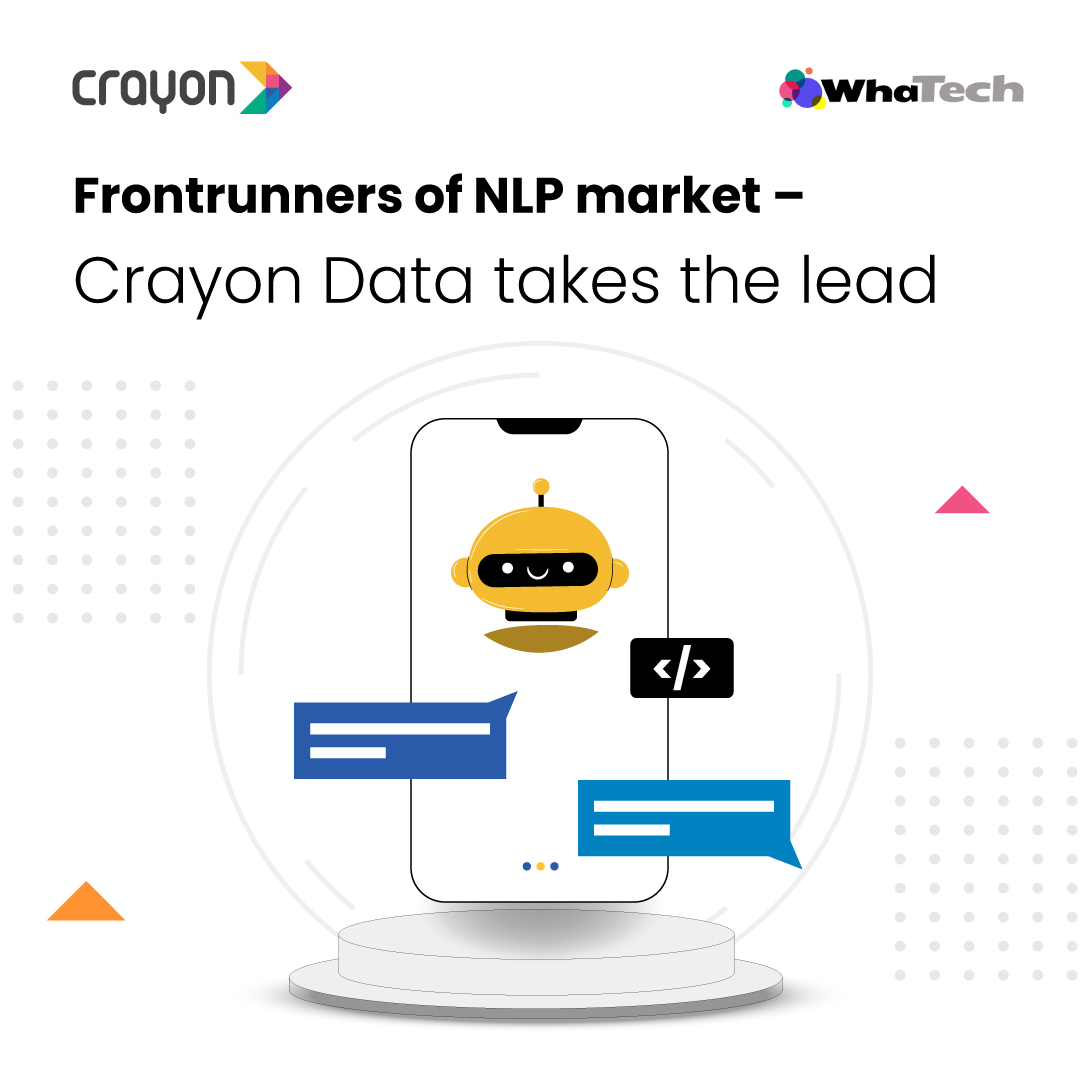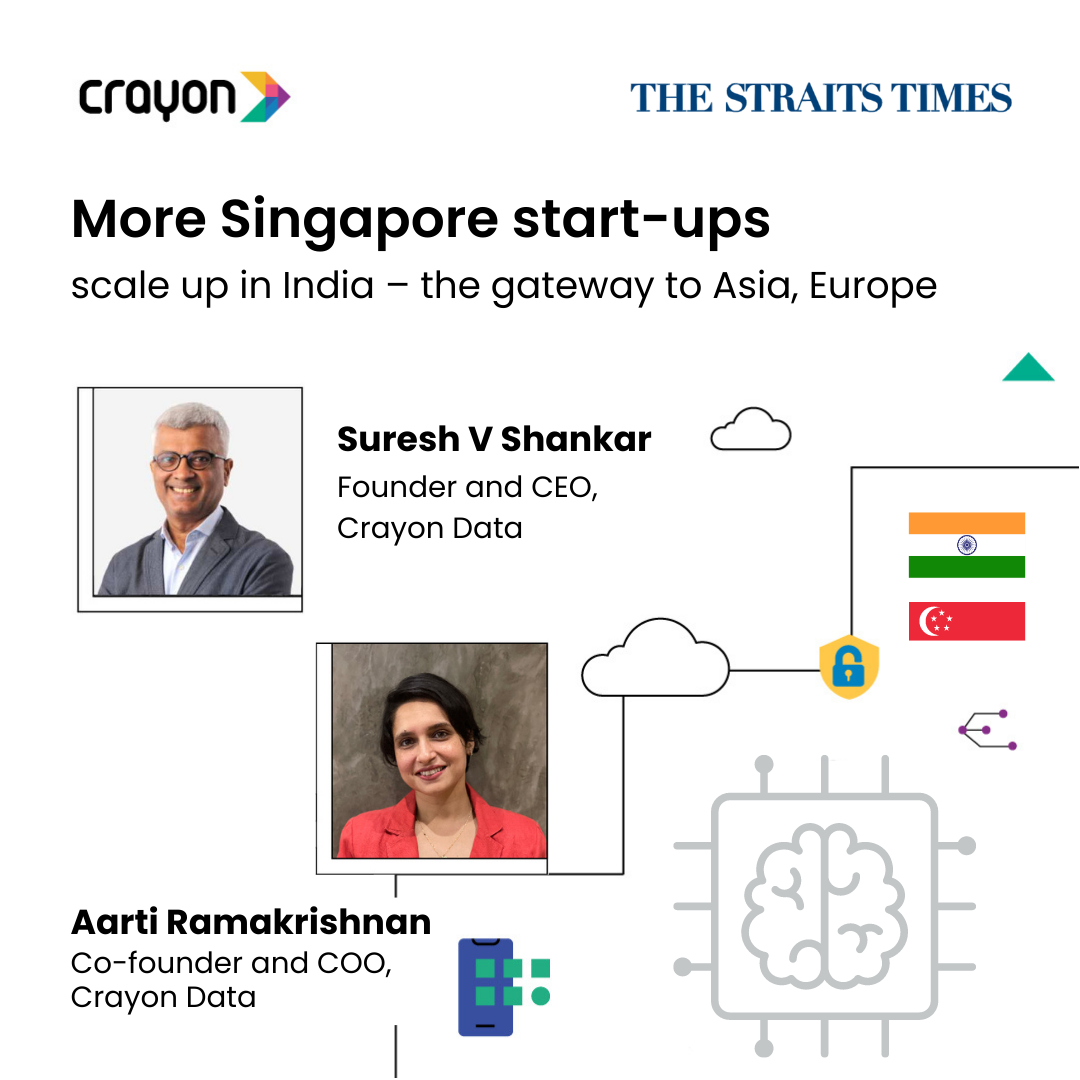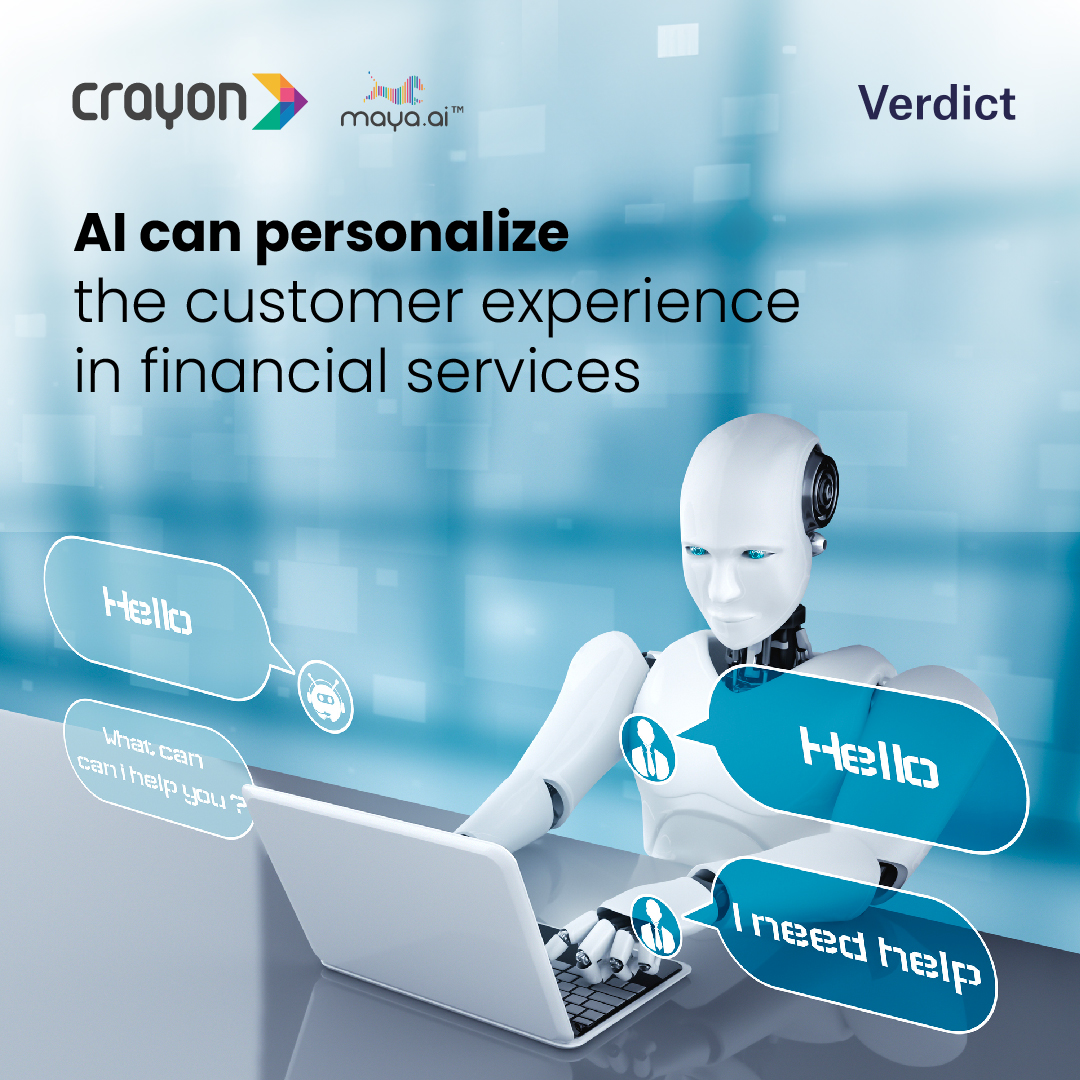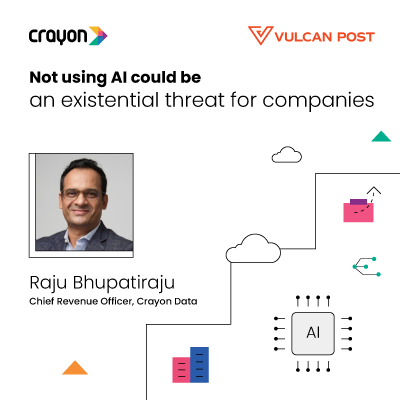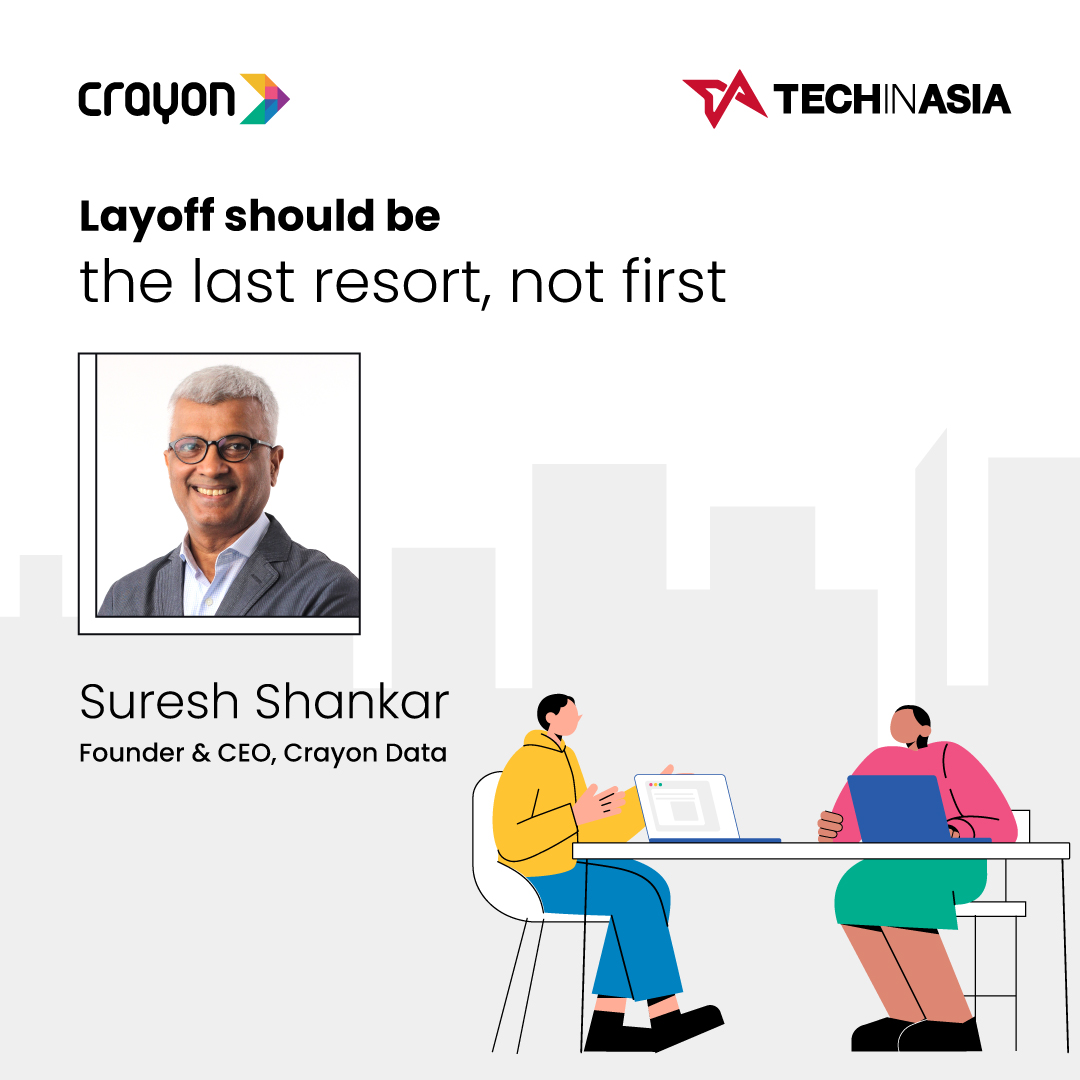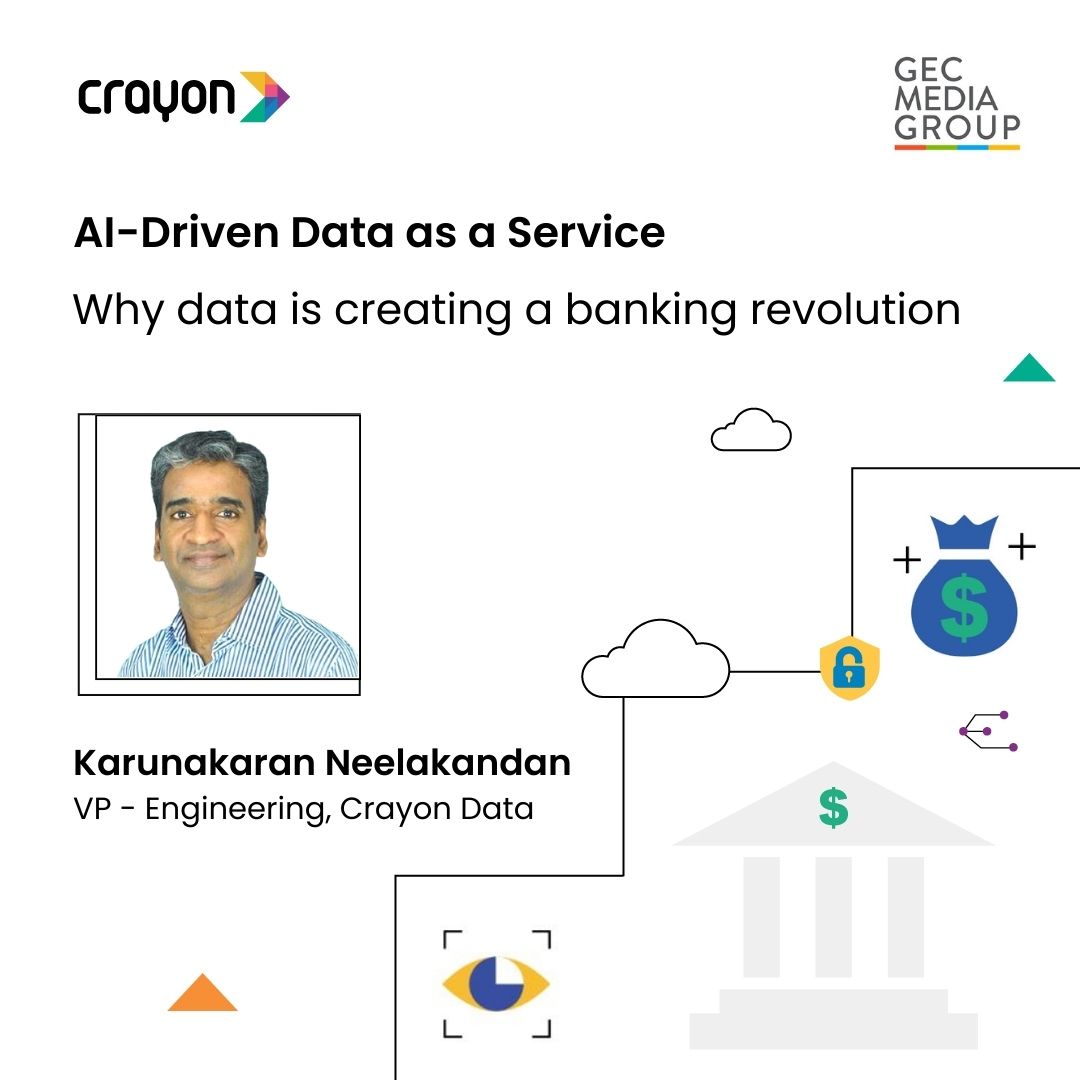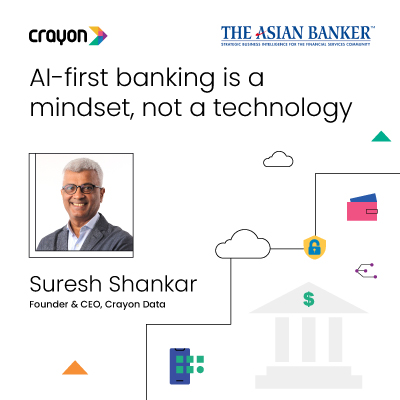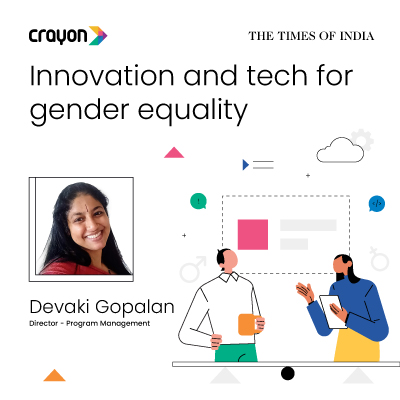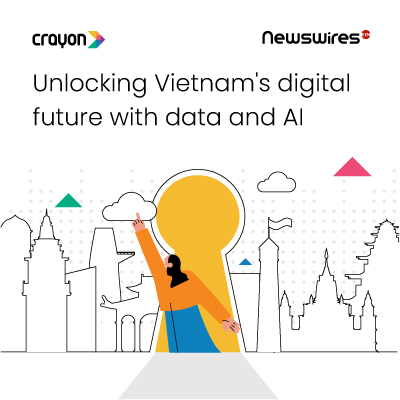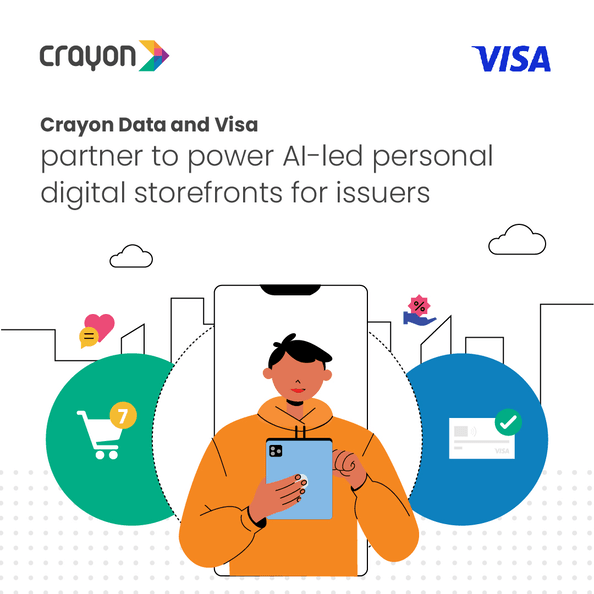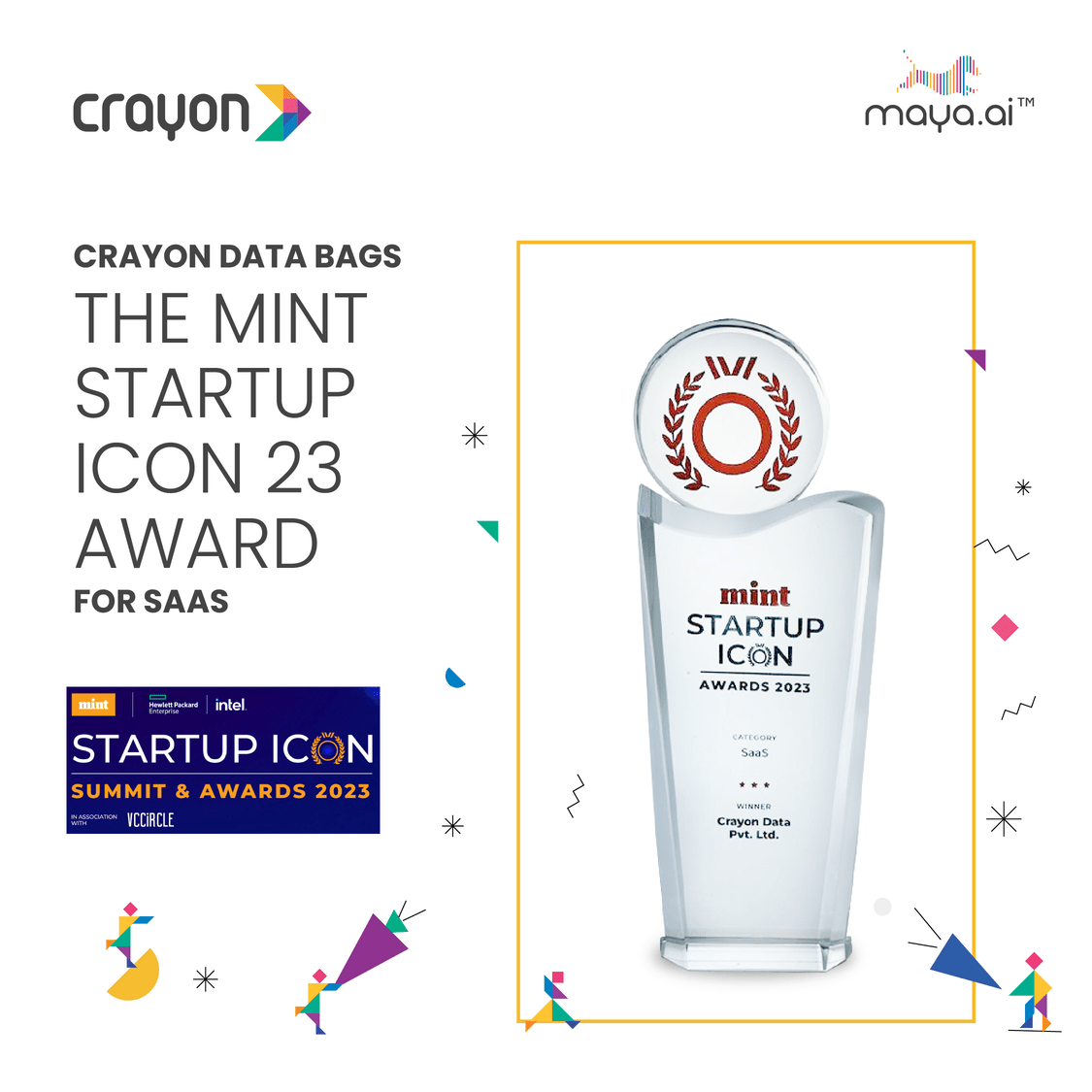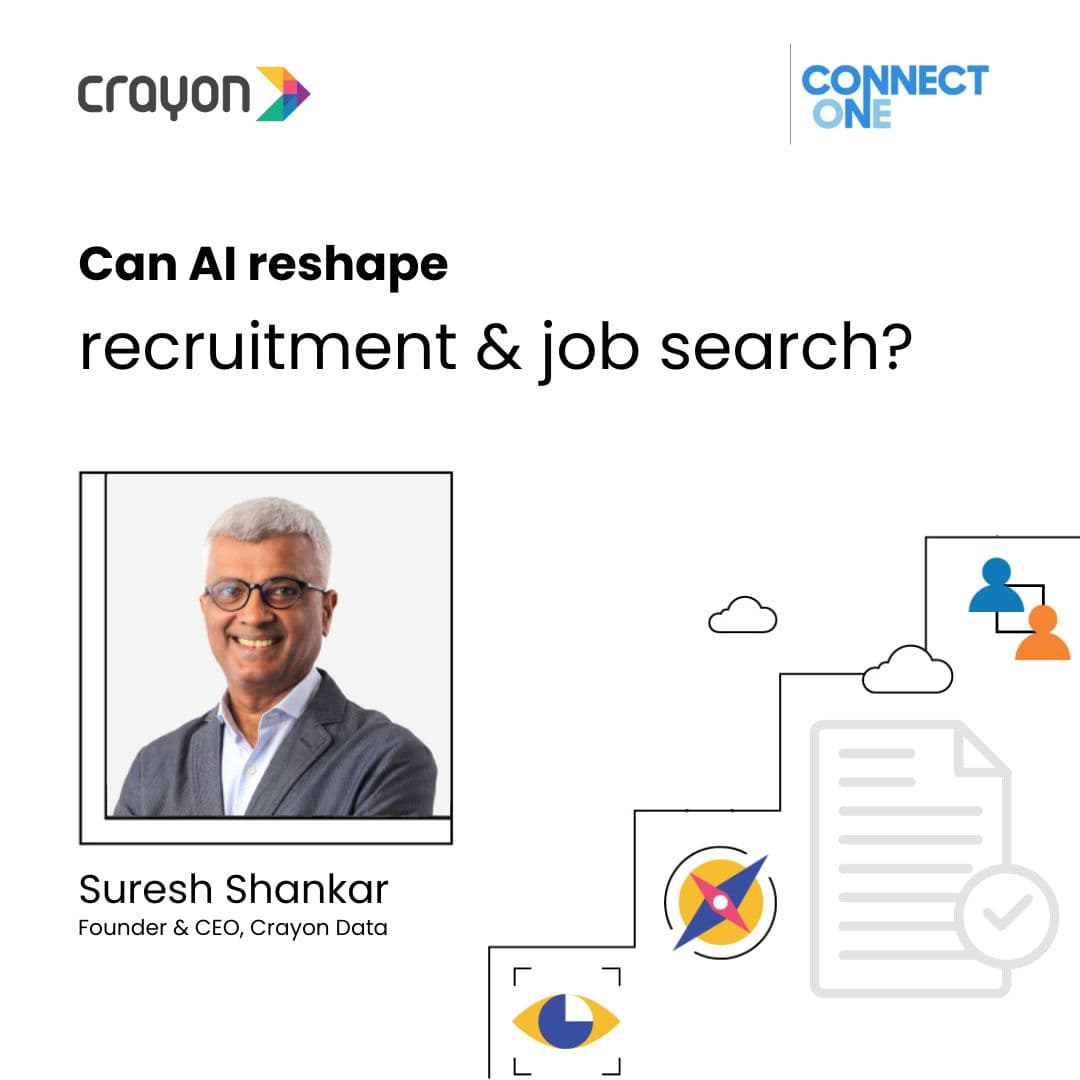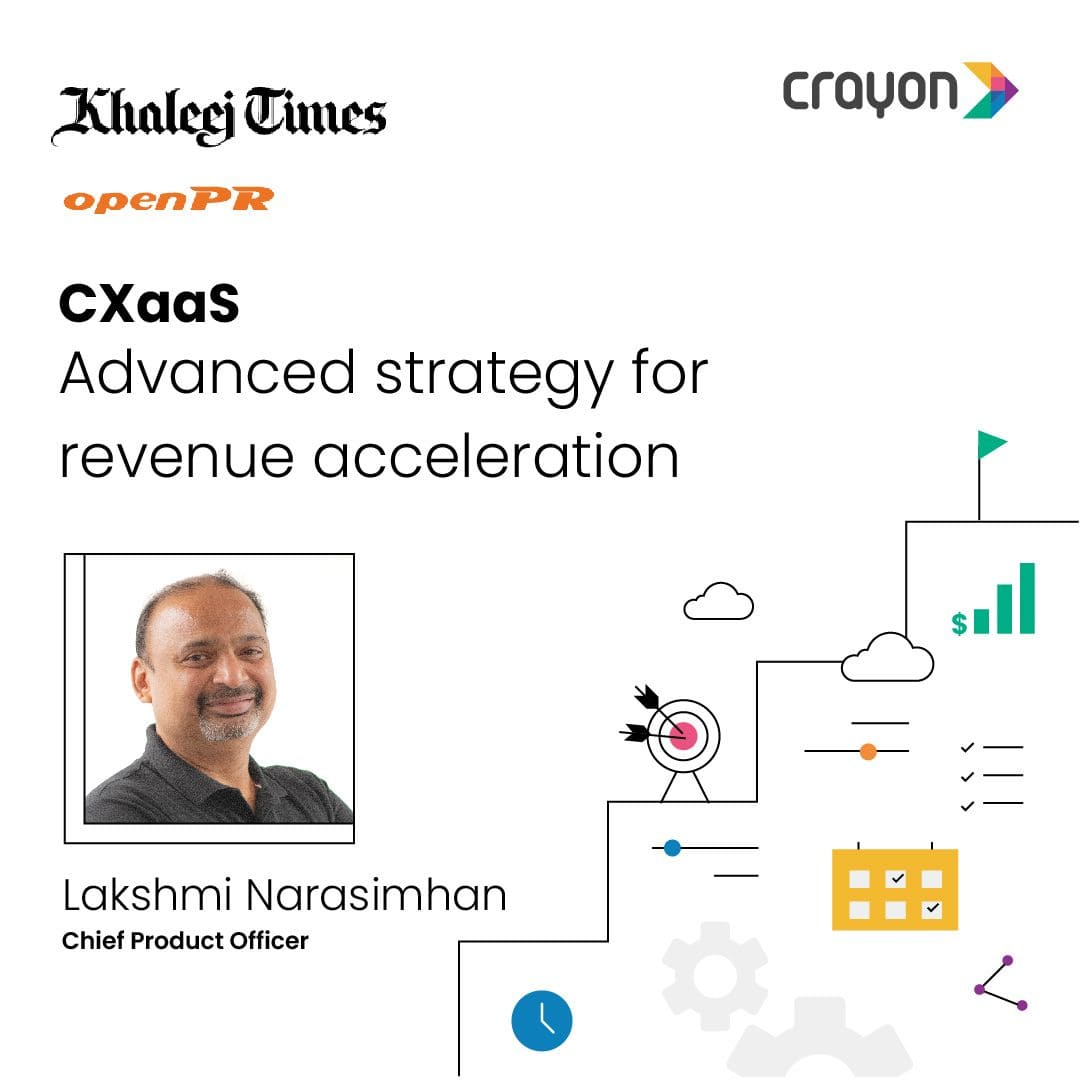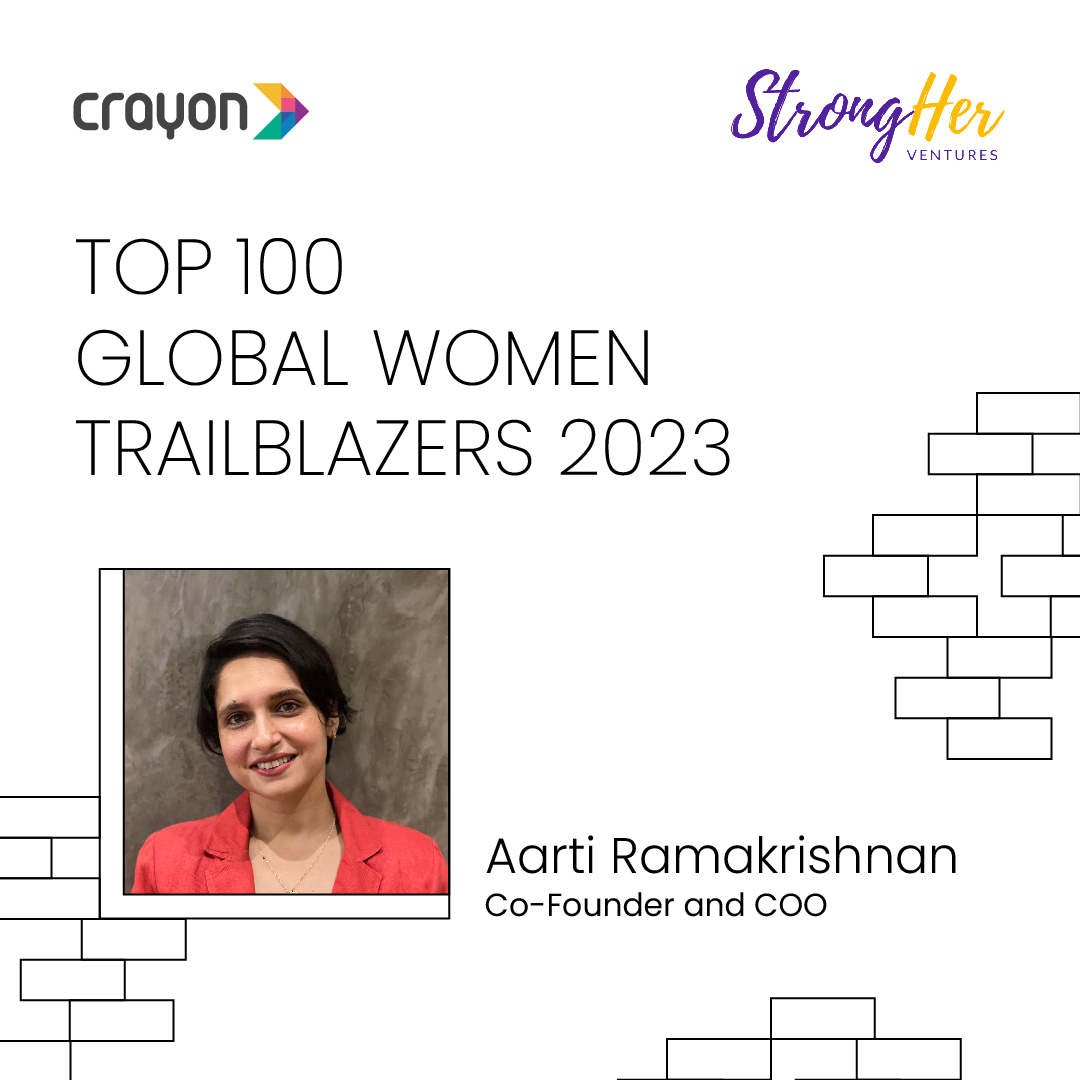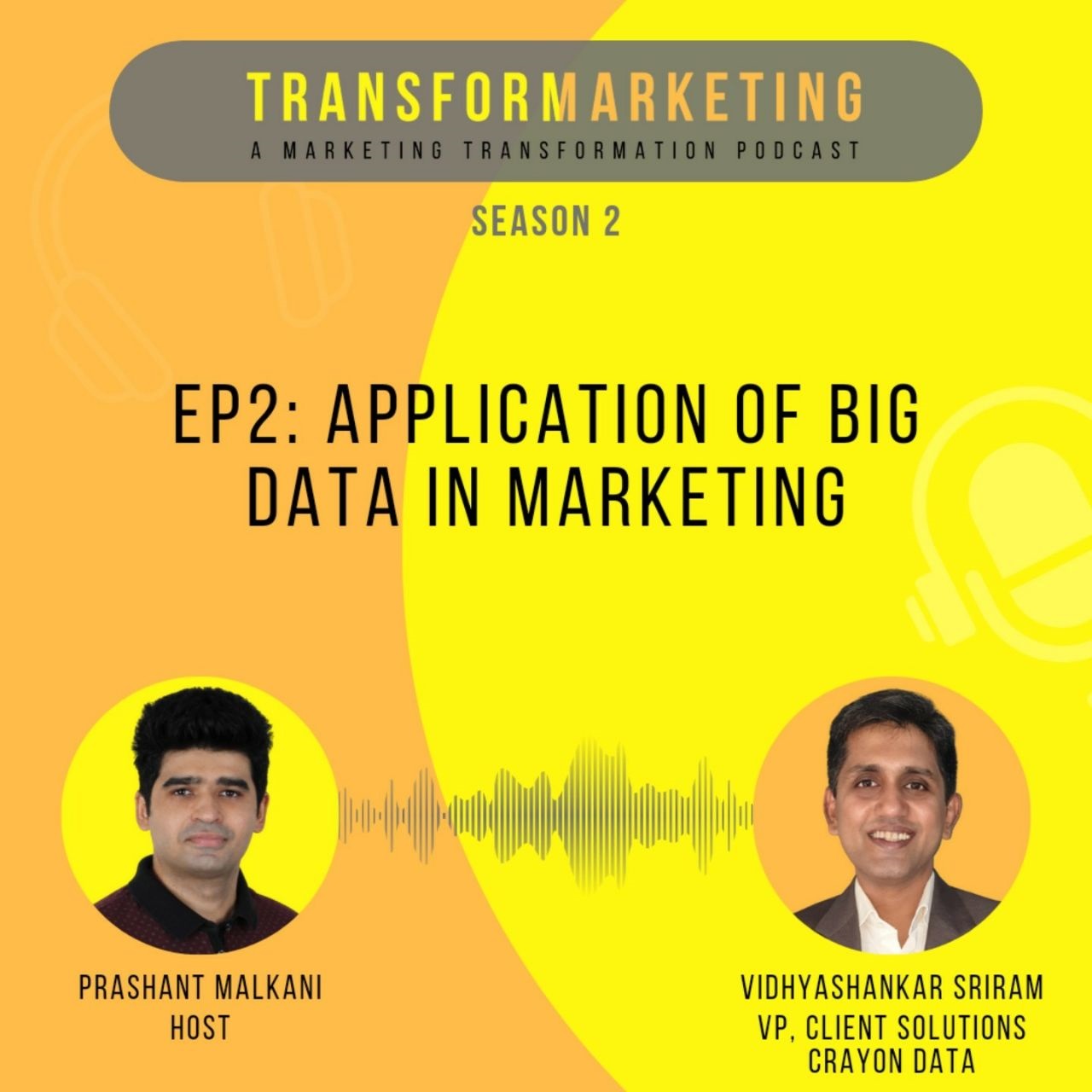Date: 18-Nov-2022
Source: Times of India
November 19 is recalled for Women Entrepreneur’s Day. Times Techies, a page for all tech news in the Times of India celebrates Women Entrepreneurs who are leading the tech industry with their ambition, innovation and resilience.
Aarti Ramakrishnan, Co-Founder & COO, Crayon Data along with other inspiring women tech leaders, gives us a few anecdotes to recall on this feature.
Don’t forget the hard calls you took
AARTI RAMAKRISHNAN | CO-FOUNDER & COO, CRAYON DATA
Aarti Ramakrishnan is no stranger to the spotlight. She is regularly featured as a woman leader in the tech sector. The company she cofounded in 2012, Crayon Data, is a data analytics company that has made waves in sectors like banking, fintech, and retail. But the early years were tough. “We wanted to venture into sports analytics, which was not even a thing back then. We felt we were doing the right thing. However, it didn’t click. We decided to pull the plug. It was a tough call to take, but the right one. We also experienced the startup Valley of Death’ and came out stronger and wiser on the other side. ”
Then there was the time when a client pulled out of a huge project. “As an entrepreneur, it can be hard to detach yourself from the situation. You are responsible for every action you take. We’ve had to make some very hard decisions. I think those experiences are sometimes easily forgotten. But I don’t think we should, because it kind of guards against the kind of mistakes that we should not make again. ”
Women are breaking all STEREOTYPES
The percentage of women in the tech workforce is rising fast; among new hires, they constitute nearly 50% for many companies. But in the entrepreneurship space, according to some estimates, women are just 14% of all founders. Here too though, the environment is changing. Many women entrepreneurs are thriving even in areas they would not traditionally enter. Falguni Nayar of Nykaa, Upasana Taku of Mobiqwik, and Divya Gokulnath of Byju’s are among those leading the way. November 19 is Women’s Entrepreneurship Day, and on that occasion, we asked women entrepreneurs about their journeys, and the advice they have for those keen to tread this path.
Lack of diversity perpetuates status quo
SALONE SEHGAL | FOUNDING GENERAL PARTNER, LUMIKAI
Throughout her career, Salone Sehgal says, she has had to navigate male dominated environments. “From investment banking, private equity, entrepreneurship and now as a general partner of a VC fund. Many times in my career, I have often been the only woman in the boardroom. ” Being a woman, she says, has often meant that she has had to work harder, longer and be better prepared than her male peers.
Ultimately, her 15+ years of professional experience, combined with a desire to alter the gender skew in venture capital, culminated in Lumikai. “We launched India’s first early stage fund for games and interactive media. I became the world’s first female general partner of a games and interactive VC fund. ”
Salone says having been both an investor and entrepreneur, she knows how critical it is to encourage more diversity and inclusion in the industry. “Because we know how the lack of female representation and women role models in an industry often perpetuates the status quo. ”
ZERO AD SPEND THANKS TO TECH
DIVYA GOENKA | FOUNDER, THE PINK MOON
Divya Goenka started The Pink Moon, a plus size fashion brand for women, because mainstream fashion brands ignored this segment of consumers who also had a desire to dress well. “While so much else has changed, the stigma against being plus size has not. Be it family, friends, neighbours, even salespeople – one gets unsolicited advice and judgement constantly. ”
In 2018, when Divya launched the brand, she says the ease with which she could access customers was amazing. “Platforms like Myntra, Jabong, Limeroad, Amazon allowed me to immediately list my products and start reaching customers with zero ad spend. I built my own website on Shopify in under a week. There were SaaS solutions for everything from payment gateways, logistics, email marketing and even graphic designing. ”
Over time, they leveraged technology to predict demand and to minimise unsold inventory. “For anyone who has a desire to start something, there are plenty of tools and tricks available, thanks to technology – one doesn’t have to pound the pavements anymore. ”
Learning tech on the job
PRITI RATHI GUPTA | FOUNDER & MD, LXME
Prithi Rathi Gupta says she is an accidental entrepreneur. She jumped head-first into the deep end as soon as she realised that she had a knack for setting up profitable businesses, leading professional teams, and the ability to balance short term goals with long term strategy. “Technology has been a passion ever since I was a child, and it’s the one thing I have actively used as an enabler tool. ” Gupta says LXME, a neobank, has been her brainchild since she was a student at Harvard Business School a few years ago. “LXME is a starting point for women to begin their financial planning journey. Technology allows us to be accessible, and create a platform that candeliver personalised financial offerings to women. ” Gupta says her deep understanding of technology even without any technical education is all thanks to the hands-on experience she gained while building the LXME platform. “We are working our way to becoming the neobank for women. ”
SETBACKS DID NOT DETER HER
RASHI AGARWAL | CO-FOUNDER & CBO, ZYPP ELECTRIC
Rashi Agarwal’s lifelong dream was to own a business of her own. Her first entrepreneurial stint was Let’s Flaunt – a customised fashion e-commerce platform. But that didn’t take off. Rashi wasn’t deterred. “I joined my partner in life as a partner in business and started Zypp Electric five years back. The idea was to drive better adoption for electric vehicles and transform the last mile delivery. We wanted to contribute to the fight against climate change. ”
They have had to deal with the challenge of inadequate expertise in the EV ecosystem. “While one can always find a lot of people with great technical knowledge working with ICE (internal combustion engine) vehicles, EVs are altogether a new space. We were constantly switching vendors, while searching for the right IoT, and looking for people who know the right fitment for our product. ”
Another challenge was inclusivity. “However, new technology has paved the way for women to pursue careers in jobs that were formerly exclusively for or dominated by men,” she says. Today, women founders are amazingly ambitious
SHANTI MOHAN | CO-FOUNDER & CEO, LETSVENTURE AND TRICA
Even as the effort towards a more equitable world continues, the sad reality is that most working women in India inevitably live and work two fulltime jobs – the second one being a dutiful mom/ wife/daughter.
As a woman running startups, I have realised over the years that it is best to stay away from men who patronise. As an entrepreneur, I would advise others to talk to their mentors, and friends when they need help, but keep away from people who play the gender card. As a woman, if you decide to start on your own and follow your dreams, you are already empowered enough to find the answers as you go along. Any conversation about women’s entrepreneurship is perhaps not complete without addressing the funding gap. This can be addressed by creating a better process to access capital and facilitating knowledge and resources for it. At the same time, I am not a proponent of gender-based investing. Women founders should get funded because they are building a good business. It has nothing to do with their gender. Today, I see women founders are amazingly ambitious. They are not apologetic about being ambitious about what they’re building, and they don’t want extra marks for being a woman.
Not for the faint hearted
ANKUR DAHIYA | CO-FOUNDER & CEO, ROZANA. IN
Ankur Dahiya did engineering, did a doctoral programme in AI & data science from IIM Lucknow, and even has taekwondo credentials. So she is not your average person. And yet, when she decided to start a venture of her own, it was a huge challenge. “Leaving a lucrative career to start your own business is not for the faint-hearted, especially when you hail from a conservative small town in Haryana. ” With no prior experience in raising money or running a business, Ankur took the entrepreneurial plunge and started Rozana. in with friends. Rozana is an e-commerce platform for rural India which has in a short time reached over 4 lakh households.
She says entrepreneurship is not just about technology; an entrepreneur must be technically sound about other aspects including management, finance, consumer, investment and operations. “As long as the business idea solves a large gap and the basics are in place, I feel there are ample growth opportunities. Learn, hear, and analyse your consumers’ behaviour, and keep innovating and pivoting your product or service based on the needs of your consumer. ”
Don’t forget the hard calls you took
AARTI RAMAKRISHNAN | CO-FOUNDER & COO, CRAYON DATA
Aarti Ramakrishnan is no stranger to the spotlight. She is regularly featured as a woman leader in the tech sector. The company she cofounded in 2012, Crayon Data, is a data analytics company that has made waves in sectors like banking, fintech, and retail. But the early years were tough. “We wanted to venture into sports analytics, which was not even a thing back then. We felt we were doing the right thing. However, it didn’t click. We decided to pull the plug. It was a tough call to take, but the right one. We also experienced the startup Valley of Death’ and came out stronger and wiser on the other side. ”
Then there was the time when a client pulled out of a huge project. “As an entrepreneur, it can be hard to detach yourself from the situation. You are responsible for every action you take. We’ve had to make some very hard decisions. I think those experiences are sometimes easily forgotten. But I don’t think we should, because it kind of guards against the kind of mistakes that we should not make again. ”
Channel anger in the right direction
VAISHALI MEHTA | CO-FOUNDER, SWA ARTISANAL SYRUPS
When angry at life, channel it right! That is what Vaishali Mehta, co-founder of Swa Artisanal Syrups, did when she was let go from a startup after she announced her pregnancy. She channelised her anger towards the entrepreneurial world, by bringing her ‘100% natural syrups’ idea to life with Swa.
Vaishali was determined to get Indian fruits and ingredients the attention they deserve. After extensive R&D, Swa developed its line of products with easy to mix concentrated syrups to make cocktails, mocktails, craft coffees, iced teas, and the like. Vaishali says her women-led company breaks the stereotype about women being ‘not so good with technology’. “We use tech to sell directly to customers. We provide better value for money to B2B customers and replace the middlemen. A customised ERP solution has been built in-house using Google sheets to forecast and manage raw material requirements, B2C and B2B demands, and also automate invoicing payments. ”
Learn to converse in tech
KANIKA AGARRWAL | CO-FOUNDER, UPSIDE AI
Kanika Agarrwal always knew she would run her own business. Her work in investment banking and venture capital gave her insights into different industries and business models. Eventually, she took the plunge with Upside AI, which uses machine learning to make investing decisions – pick the right stocks and assets for clients, given the then market conditions.
She was not a technical person. But she learned Python during the pandemic. “I am now able to fluently converse about our platform’s tech capabilities and how the algorithm works. ” Young women, she says, must always remember that literacy comes in many forms. “Computer literacy has become as important as, say, English literacy. The ability to at least read and converse in a language both you and the tech person can understand is the bare minimum requirement as you enter the job market and want to excel (irrespective of the industry you end up in). ” For women looking to build a career in tech, think ten years out, she says. “The guys who were ‘good at computers’ are the people working on machine learning/ AI today. ”
CONNECTING TO RURAL INDIA WITH TECH
ZARINA SCREWVALA | CO-FOUNDER, SWADES FOUNDATION
Zarina Screwvala co-founded the Swades Foundation with her husband to help rural India become more self-sufficient. They adopted villages in Maharashtra for the project. She says digital solutions have been a game changer in interacting with rural India. “When Covid struck, we could not access our communities initially. It opened many of us in the development sector to the amazing opportunities of digital technology. ”
Today, she says, should a similar crisis occur, they are more prepared and should be able to reach their over 740,000 strong community through a digitally connected network of 300 full-time staff and over 11,000 community volunteers. “Through our Digital Swades initiative, we discovered women are the most enthusiastic participants for our workshops. Today we have over 3,000 women who have attended Zoom sessions on topics ranging from nutrition for women and children and scaling of sustainable livelihood opportunities to capacity building for self-help groups. ”
Overcome self-doubt and just do it
ASHVIJA VIJAYENDRA | FOUNDER, PINK TECH SOLUTION
When Ashvija Vijayendra started Pink Tech Solution in Guwahati, there weren’t many women to guide her. “As a married woman setting up a software company, the main challenge was to overcome self-doubt and self-loathing. We are ingrained to believe that women’s primary responsibility is towards the family. As any startup requires immense time and effort, it is bound to distract from the ‘primary’ responsibility. But the key is to accept it and tell that person in the mirror that she deserves this chance, that she can do it, and the family’s primary responsibility is to support each other. ”One of Ashvija’s life philosophies is based on Nike’s ‘Just do it’. “The aim is not perfection, the aim is to keep trying. Today you are just a web search away to get your first certification online. If you are unsure which technology suits you best, YouTube provides ample videos on the basics of any technology. For inspiration, read about Susan Wojcicki (CEO of YouTube), Roshni Nadar Malhotra (chairperson of HCL Technologies) and Reshma Saujani (CEO of Girls Who Code). ”
Crucial lesson: Technology brings scale
MEGHNA MITTAL | CO-FOUNDER & CMO, GSHARP MEDIA
After three years in cancer research, Meghna Mittal, a biotechnologist by education, decided to launch a venture of her own. Called GSharp Media, it today has two brands. “We started with Songfest, a niche service-based music solutions model for brands and enterprises, and then went on to build Hoopr. ai, India’s largest music licensing platform. It is a technology-focused platform that enables creators & brands to discover and licence music for their audio-video content!” Meghna says understanding that ‘technology brings scale,’ was a crucial lesson for her. This motivated her to learn the nuances of building a digital product – from ideation to wireframing to designing, interacting with the tech teams to develop the modules and features, and finally taking it to the users to see the viability of the platform. “It was not easy, coming from a non-technical background, to think and talk technology initially, but the more I learned, it opened my mind to think about the larger impact of technology. ”
BUILDING FASHION BRANDS WITH TECH
ROOPAM NAYAK | FOUNDER, HOUSE OF BRANDS COMPANY (HOBC)
The biggest challenge in launching a premium/ luxury brand is the need to set up production lines and the associated capital expenditure. If you outsource manufacturing, there is a minimum order
quantity (MOQ). To solve these two problems, Roopam Nayak and her team used technology to set up hundreds of complex ready to manufacture’ (RTM) production lines in India and SouthEast Asia. RTM lines can churn out small batches of products extremely fast. The efficiency of RTM lines inspired Roopam to start HOBC.
HOBC is a cluster of premium D2C (direct to consumer) brands, designed for the “California users of India”. With RTM, and a theoretical zero MOQ, Roopam is launching a new brand every 6-8 weeks. Her vision is to build over 100
brands under one umbrella. This is her advice for anyone who wants to start a D2C brand: “Focus on your product and everything else will follow. Earlystage funding is abundant these days. This is your time to build. ”
Ask questions, don’t hold back
AAYUSHI KISHORE | CO-FOUNDER OF FIRE-BOLTT
In 2015, Aayushi Kishore teamed up with her brother to start Fire-Boltt, a venture to create high quality, affordable smartwatches. Today, it’s one of top smartwatch brands. “With technology at its roots, we are working to create an ecosystem where hardware and software work together seamlessly to make us healthier. ” Aayushi says Fire-Boltt’s R&D team is working on some really cool things. “What I love about technology is how fast it’s evolving and how it’s getting easier for people like me who are not very technical to contribute and integrate aspects into our business. With API integration, we are able to get data from a large number of customers and receive real-time sales insights that we can use to tweak the product or create new solutions. ” Young women, she says, should not be afraid to ask questions. “I often find myself holding back out of concern that people will think I’m asking a silly question, but trust me, no one really cares, and if they do, it’s their loss, not yours!”


For more news on what we do at Crayon Data, click here

